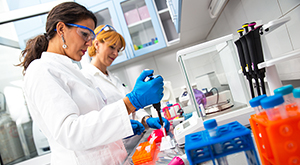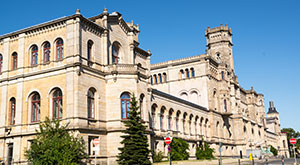Postdoctoral Research Funding in Germany
Postdoctoral researchers are generously supported in Germany through grants, loans and fellowships. More than 32,000 international researchers in Germany currently receive funding, either through universities, non-university organisations, companies or EU initiatives.
The amount awarded depends entirely on the size and nature of the project and whether you will be joining an established group or conducting solo research. As a general rule, German research grants and fellowships cover the basic costs to complete the project. However, some funding programmes include supplementary contributions to cover travel, childcare, accommodation and German language programmes. Grants are usually temporary (around 2-5 years) so junior researchers will need to plan financially for their stay in Germany beyond their funding term. Grants and fellowships may also be awarded for group research and are usually equally distributed between postdocs and group leaders by the awarding organisation.
Awarding organisations
Grants, fellowships and bursaries are awarded through various sources, including:
- The German Academic Exchange Service (DAAD)
- Federal and state government organisations such as the DFG (German Research Foundation) and the Federal Ministry of Education and Research (BMBF)
- European Union initiatives (such as the Horizon 2020 programme)
- Universities
- Non-university research organisations (such as the Alexander von Humboldt Foundation, Max Planck Society, Fraunhofer Society, Leibniz Association and Helmholtz Association)
- Private companies and industry
- Charitable organisations
For more information about these organisations, visit our Research Institutes in Germany page.
Types of funding
The wide variety of grants, fellowships, loans and prizes open to postdocs cover almost all research fields. Organisations such as the Alexander von Humboldt foundation offers targeted funding for international researchers, such as the Georg Forster Award for researchers from developing countries (up to €2,650 per month plus allowances) and the Sofia Kovalevskaja Award (up to €1.6 million for groups of researchers to carry out a five-year research project). EU fellowships include the Marie Sklodowska-Curie Fellowship, a grant offered to researchers of any nationality to carry out research within a German university or research institute (up to €4,650 per month plus allowances).
Other grants include the Max Planck Society Grant for Advanced Postdoctoral Training, and the Leibniz-DAAD Research Fellowship, which offers highly-qualified foreign postdocs the opportunity to conduct special research at Leibniz Association institutes in Germany. The Leibniz Association also offers targeted grants and mentoring programmes to female postdocs in order to help boost the numbers of women in senior research positions.
German industry also plays a significant role in funding talented junior researchers. Companies such as Airbus, Bayer, Volkswagen and Mercedes invest heavily through internships and dual programmes around the world, particularly in the scientific and engineering fields (see below for useful links).
For a full list of grants and fellowships available to postdoctoral researchers in Germany consult the Research in Germany website.
Helpful Links
DAAD: The German Academic Exchange Service's postdoc scholarship database.
DFG: A self-governing organisation for science and research in Germany. It serves all branches of science and the humanities.
Federal Ministry of Education and Research: Supports and oversees research programmes in Germany and around the world.
Airbus: Graduate programmes and scholarships offered by Airbus.
Volkswagen Stiftung: Information about Volkswagen grants and internships.
GO-IN: Goethe International Post Doc program.
GAIN: German Academic International Network (in German).
Horizon 2020: European Union framework for research and innovation.
Max Saved Jobs Reached
A maximum of 500 Saved Jobs can be created against your account. Please remove an existing Saved Job in order to add a new Saved Job.
Manage Saved Jobs









